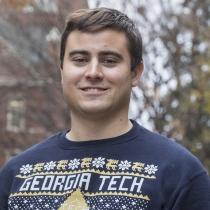
Joseph D Sparta
What is your next adventure?
I'm going to go to grad school to study machine learning. I want to focus on robotic design development. I want to combine my AE degree with AI and machine learning because, eventually, that will put me in the position to design space robots. I'm applying all over the country because I want a change in scenery.
What about your next adventure are you most looking forward to?
I am looking forward to a change in scenery. I'm from Pittsburgh and it was great to come to Atlanta. Now I'm excited to move to a different location. The other thing that excites me is that, in grad school, you get more freedom and more creativity in your work.
Did you have any previous co-op, internship, or research experience in this area?
I worked two summer internships at United Launch Alliance - one in flight design and the other in propulsion focuses on fluid design. After that, I was offered a co-op at NASA Johnson, possibly the highlight of my co-op experience. Since NASA makes you work in different departments, you get a different perspective on things. They even put you in places where you have no experience to force you to be resourceful. The program is their recruiting tool, so that's a smart move. My three rotations were in propulsion, EVA [extra-vehicular activity] and robotics. The robotics tour showed me how much I liked control systems. I'm absolutely fascinated that you can create something to act and think on its own. Robots really have great potential for good.
Research-wise, I worked with Dr. Braun in the SSDL [Space Systems Design Lab] on a parachute flight dynamics project, and at GTRI with Dr. Mick West, where we were trained to create robotic mechanisms that could measure ice underwater in Antarctica.
How did your educational experience at GT-AE help you achieve that goal?
The number of resources that are available to the students is incredible. And there are a lot of people who'll go out of their way to help you. The obvious ones are faculty, classmates, and your TA. But there's also the Career Center and the Career Fairs, the Academic Success Center. Early on, I thought that the curriculum and the education were just to teach you how to absorb a lot of technical information to use later. But I realized halfway through that that's not, in fact, what makes Tech special. It's that you learn how to solve different problems, how to take an 'unsolvable' problem and have the confidence to tackle it. Once I realized that, I got even more out of my classes and my faculty.
What advice would you give to an underclassman who would like to follow the same path?
Get involved with your education early and stay involved. There are a lot of resources that Tech offers. You are paying for them, so you may as well use them. There is a Fellowship Office that does nothing but help you identify and apply for fellowships. I started early on to find out about resume building and jobs. The Career Center helped me with the hardest part about finding a job: you don't have experience. They can show you how to present what you do have. And talk to people who are working where you want to work. Whatever course you find yourself interested in - ask that teacher if you can do research. They might not have anything when you ask, but later on down the road, they might remember you.